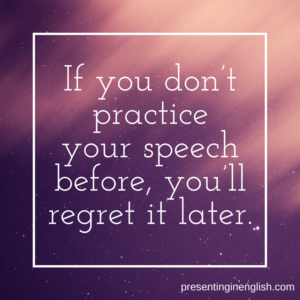
You’ve just finished writing the best presentation ever, but you don’t have any time left to practice it. Later, you are in the middle of delivering it, when you realise you are repeating yourself. Or worse you run overtime and don’t have time to finish your presentation, leaving out some key points.
Sound familiar?
By practicing your speech you can make sure:
1. Your words come out naturally
As a non-native speaker of English this one is probably the most important benefits of rehearsing your speech. Writing words that you understand and saying them are two different things. You may discover you have difficulty pronouncing certain words or that some ideas you want to share are difficult to express in an easy way.
By practicing your presentation, you will be able to better choose words that you can say easily. If there is a difficult concept you need to explain, you can practice that part several times in several different ways. Then write out the exact phrases you want to use to best communicate your message.
2. You are on time
By practicing your speech you can get a good idea of how long it will take to deliver. You will find out if you need to cut some non-essential parts to meet a time limit or if you have extra time to expand on certain points. A timer or a video camera obviously comes in handy with this.
3. You use visuals aids smoothly
Many speakers have the bad habit of looking at slides they are presenting or worse reading from them. When you do this you lose eye contact and your connection with the audience.
The more you practice, the more confident you will be with the content of your slides. You won’t need to look at them after a few rehearsals or only to show something specific to the audience.
You will also become smoother using the presentation remote or any other object you have to handle during your presentation.
4. Your body language is relaxed
You can also practice your body language. A presentation is not just about the words you use, but also about how you use your body to communicate your ideas. Are you going to move on stage? Where are you going to put your hands? Will you make any gestures?
Your body is also a big indicator of nervousness. Clenched hands, stiff posture and feet rooted to the floor are all signs that you may be nervous. With practice you will know your presentation content better and these signs of nervousness will be less obvious.
5. You won’t need your notes (as much)
Another benefit of knowing your presentation content better is that you will need fewer notes. This lets you have more eye contact with the audience and there is less risk of you getting lost in your papers.
How to practice?
You may have been told to practice in front of the mirror. This common piece of advice may help you to watch for any distracting body language, but doesn’t recreate the real feeling of a presentation.
Your first step should be to videotape yourself. This way you can see and hear yourself. Did you speak too quickly? Did you keep your hands clenched? Did you pace back and forth? Getting feedback is the only way you can really improve your presentation.
If you are giving a high stakes presentation, you may also want to practice the speech in front of somebody else. This can be friends, colleagues, a spouse or a coach. They can give you objective feedback. You can even discuss your target audience with them to get more specific feedback.
Whenever you are rehearsing you should simulate the presentation environment as much as possible. Imagine how much space you will have to speak and use that space when you are practicing. Will you be using a microphone or will you have to project your voice? Will you use notes? If so where will you put them?
Most importantly as the saying goes – practice, practice, practice!
